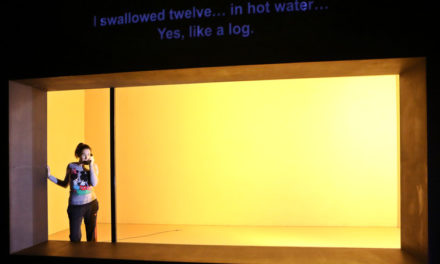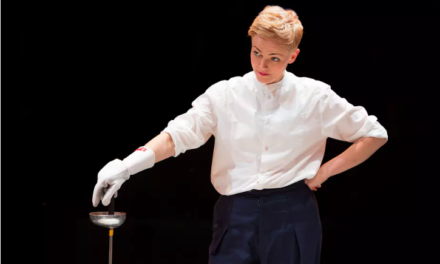New plays can derive from many sources: a vivid imagination, novels, diaries, real-life episodes, autobiography, biography and history. Elena Mazzon’s The Popess, drawing on the real-life figures of Giugliema of Bohemia and Maifreda Pirovano, one of her staunchest followers, places centre stage a remarkable and little known women’s story. In a tiny, darkly lit studio theatre at the Free Fringe, where audience members sit on stools scattered here and there, a female figure dressed in black begins walking around the space. She carefully weighs us up, a beautiful, gentle smile lighting her face. Meet Sister Maifreda, aka the Popess, interpreted by Elena Mazzon. She asks us questions, such as what would you be willing to die for? What are you looking for in religion or in faith? This interactive strategy invites us to think about how we stand on these issues and also learn what other audience members think. She introduces the story of Guglielma, a former Princess of Bohemia, who came to Milan around 1260, when she was around fifty, accompanied by a grownup son. Guglielma went on to found a religious movement, the Order of the Umiliati (the Humble), in which men and women of all ages and from different walks of life, could pray and eat together, something that was highly unusual in the thirteenth century. Her fame soon spread – she performed miracle cures and, even more remarkably, it was said she was imbued with the Holy Spirit. From time to time, the actor switches roles, becoming an archetypal Everywoman, who embarks on a journey of self discovery. She is, at the same time, a woman from the Middle Ages and a modern figure, whose story, related with a thick Italian accent, is punctuated by lighthearted, humorous anecdotes. Then suddenly the mood changes. The actor begins to take off her costume, asking an audience member to help her pull on a heavy brown tunic. She morphs into the Inquisitor. It’s 1300, the Holy Jubilee Year, and in Milan the Inquisition is at its peak. Among others, Guglielma’s movement comes under the axe. In this new role, Mazzon’s expression turns nasty and threatening, at other times, comically grotesque, his behaviour is so over-the-top. He ruthlessly sentences many to die at the stake, including The Popess, Sister Maifreda, and other sisters of the movement. What’s more, he orders the remains of Guglielma, who died around 1280 (the exact date is unknown), to be unearthed and burnt. Other followers are punished. Some have to wear a double cross, others pay a fine. Elena Mazzon researched and wrote the play after reading Professor Luisa Muraro’s, Guglielma e Maifreda: Storia di un’eresia femminista (Guglielma and Maifreda: the Story of a Feminist Heresy). This skilled performer embodies the various figures in the story with passion and conviction. No newcomer to one person plays, director Colin Watkeys has paid careful attention to the body language and voices of the different characters and enhances the ever-changing tragi-comic tone of the play. After Edinburgh, the play will visit the Catania Fringe, London and hopefully Milan.

The Popess, directed by Colin Watkeys, starring Elena Mazzon. Edinburgh Fringe 2024. Photo credits: Luigi Russo.
This post was written by the author in their personal capacity.The opinions expressed in this article are the author’s own and do not reflect the view of The Theatre Times, their staff or collaborators.
This post was written by Margaret Rose.
The views expressed here belong to the author and do not necessarily reflect our views and opinions.


















